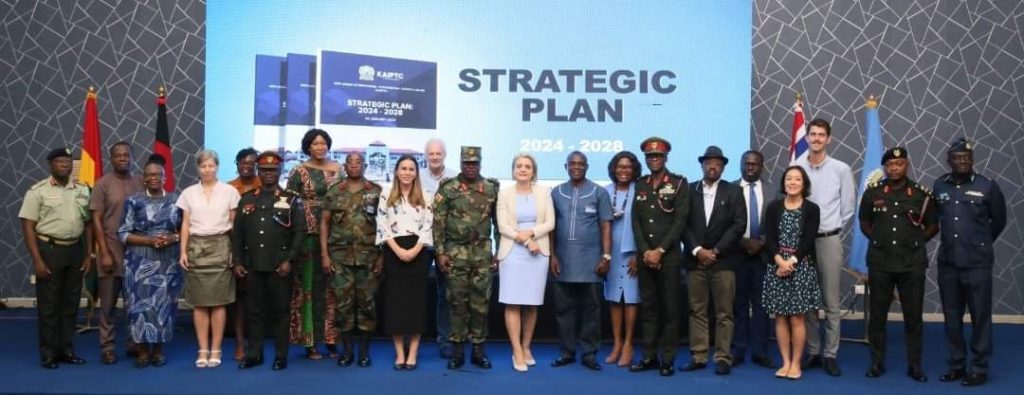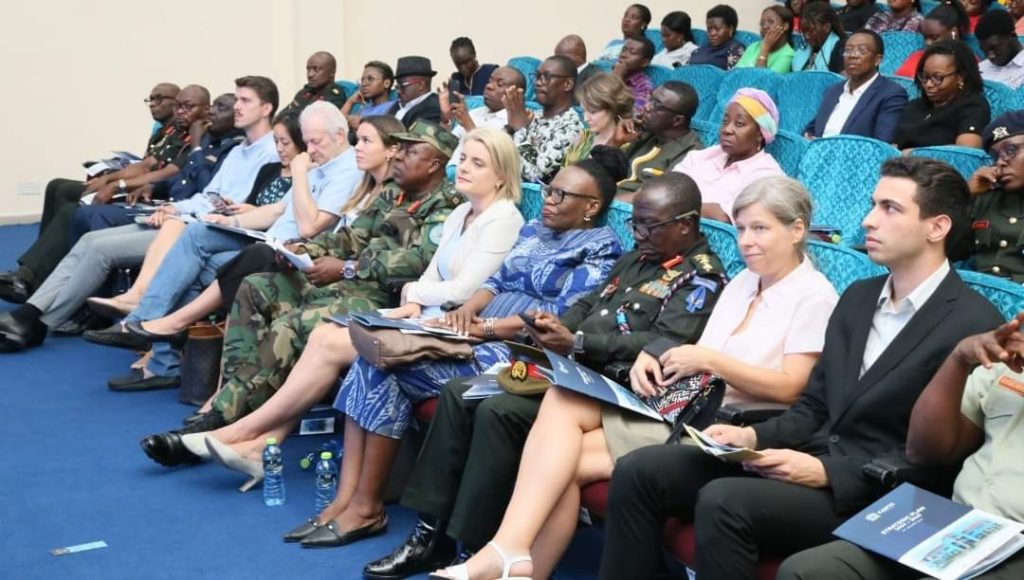By James Amoh Junior
Accra, April 29, GNA – The Kofi Annan International Peacekeeping Training Centre (KAIPTC) has unveiled a comprehensive five-year strategic plan to better enhance peace and security across the African continent.
Among other aims, the strategic plan from 2024 to 2028, provides a direction for the Centre in the next five years and further projects it as the ‘go to’ place on African peace and security issues.
The Strategic Plan reflects a comprehensive and innovative approach that encompasses training, research, education, policy development and advocacy.
The plan will help to better train, educate and equip Africans, shape public opinion and policy, create and deepen awareness on peace and security issues and influence policy in the field.
The Centre’s strategic objectives will focus on several thematic areas including: Peace Operations, Stabilization and Peacebuilding; Governance, Leadership and Security; Technology and Peace; Women, Youth, Peace and Security; Climate and Environmental Security; Strengthening partnerships with Multilateral Institutions and Regional Organizations and Improving institutional and financial sustainability.
Those thematic areas will afford the centre the opportunity to consider and analyze the real drivers of conflict on the continent holistically and determine strategies to address them within these specific areas.

Established by the Ghana Armed Forces in 1998, the KAIPTC has trained and educated over 31,000 individuals from various African countries and beyond, equipping them with the necessary skills to engage in peacekeeping operations, mediation processes and conflict resolution.
Major General Richard Addo Gyane, the Commandant of the KAIPTC, speaking at the launch of the five-year strategic plan, said as the continent and the world faced geopolitical tensions, religious and ethnic conflicts, climate change, governance deficits and violent extremism, among others, the Centre recognized the urgency of addressing these issues and strived to be at the forefront of evolving peacebuilding strategies.
He said by equipping key players including relevant participants, key decision makers, leaders and policymakers with the necessary tools and knowledge, the Centre could contribute to the promotion of effective prevention, management, resolution and transformation of conflicts on the continent and beyond.
To achieve those goals, the Commandant said the Centre had laid out a demand-driven strategic framework centred around very important pillars:
training and capacity development, evidence-based research, education and knowledge generation, policy development and advocacy, partnerships and collaboration, governance improvement and resource mobilization.
“…we shall continue to provide high-quality and innovative training programmes for military, police, and civilian personnel deployed in peacekeeping missions and others generally involved in peace and security, leadership and governance issues, among others,” he said.
Major General Gyane stated that with a well-established focus on women, youth peace and security, the Centre focused on implementing and strengthening the women and youth peace and security agenda on the continent.
He said, “We contribute to shaping the discourses on this subject as well as developing capacities of women and the youth to unlock their potential and contribute to a peaceful and secured Africa.”
The Commandant noted that the Centre would continue to foster partnerships and strengthen cooperation with multilateral institutions, academic institutions, think tanks, training centres, development partners, civil society organizations, and national, regional and international institutions, among others, to bolster its research and knowledge-sharing capacities.
He said strengthening internal governance systems and resource mobilization was pivotal in ensuring the successful implementation of our strategic plan.
“We recognize that strong internal structures, a healthy and productive workforce, institutional, financial and technical resources are essential to driving our work forward and expand our reach,” he said.

Ms Pauline Okkens, Political Advisor, German Embassy, one of the major partners of the Centre said, Germany appreciated the fact that “Climate and Environmental Security” was identified as a thematic area and focus for the next five years.
The challenges of the climate crisis, she said, were becoming increasingly relevant to security policy, and the importance of preventing, mitigating and resolving conflicts that arose due to the impacts of the climate crises could not be overemphasised.
She reaffirmed Germany’s continuous support of the KAIPTC, stressing that Germany had been a staunch supporter of the KAIPTC since its inception.
“We will continue to provide the needed support both financially and technically to the Centre’s efforts of training military, police and civilian men and women for ever more challenging peace support operations across the world,” Ms Okkens said.
GNA